Excommunicated: The women fighting to be priests
Anne Tropeano is ironing her clothes in preparation for a busy day ahead. She gets out her white alb and her ornately embroidered chasuble, garments worn by Catholic priests around the world. On a calendar on her wall, bold red pen marks that tomorrow is "Ordination day".
But she is also on the phone hiring a security guard for the service in a church in Albuquerque, New Mexico, where she lives - as she anticipates there could be hostility.
"It's a tense issue, not everybody is open to even considering the possibility of women being called to priesthood," she says. It's not only harassment in person that Tropeano is concerned about. Since sharing her hopes of becoming a Catholic priest, she says she's experienced "breath-taking" online harassment.
Tropeano is one of over 200 women across the world who are part of the Roman Catholic woman priest movement, a group who are taking part in unauthorised ordination services to become priests, in an act of defiance against the Roman Catholic Church.
The Catholic Church does not allow women to be priests. In fact, the Vatican sees it as a serious crime in canon law that is punishable by excommunication. This means the women, once they've taken part in an 'ordination', are unable to receive the sacraments, including communion, or have a church funeral.
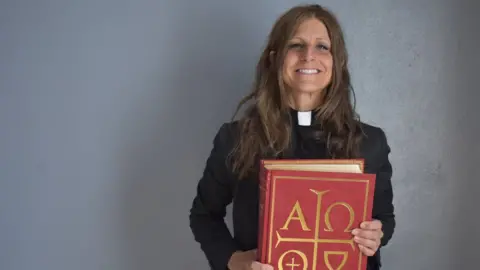 Anne Tropeano
Anne Tropeano"Excommunication was the reason I wasn't able to entertain becoming a priest for a long time," she says. "I was going to mass every single day. I worked for a parish, my whole life was in the church. So to think about giving that up, I couldn't even really imagine it."
Tropeano is a devout Catholic, who after years of doing other jobs including managing a rock band, felt the call to priesthood: "I would hear this. You are my priest, you are a priest. I want you to be a priest."
The only option open to her as a woman was to serve the Church in another role - such as a nun or as a lay contributor to her diocese. Or she could walk away from Catholicism entirely, to another Christian denomination that would welcome her as a priest.
After years of personal discernment, she realised the limitations of the Vatican rules were not going to let her live out this call: "Once I recognised that this was the next step, the excommunication was just part of the journey."
Tropeano, and other women like her, are also seeing their choice to be 'ordained' as a way to campaign against what they consider a sexist rule by the Church.
 Olga Lucía Álvarez
Olga Lucía ÁlvarezFrom Reform Judaism to many Protestant denominations, other faiths are open to the ordination of women. Yet for the Catholic Church the ban on women's access to priesthood is based, among other arguments, on Biblical records that Christ chose his 12 Apostles only from among men, and the Church has gone on to imitate Christ ever since.
For Tropeano, the impact of this rule is far-reaching.
"By the Church teaching through its actions of excluding women from [priestly] ordination, it's teaching that women are inferior. Women learn this, little kids learn this, men learn this… So they go out into the world and they live that way."
Ceremony on a cruise
The movement for women priesthood gained visibility in 2002. A group of seven women took part in an illicit ordination service aboard a ship on the Danube River, on international waters to avoid conflict with any ecclesiastical region.
Yet there were reports of previous secret 'ordinations', such as Ludmila Javarova's, who during the Communist rule of Czechoslovakia in the 1970s took part in a service led by a Roman Catholic bishop.
The women's ordination movement is now mostly a European and US group, but it has expanded its representation in other parts of the world.
Colombian Olga Lucía Álvarez Benjumea was the first female 'priest' in Latin America, a bastion for the Catholic Church with more than 40% of the 1.3 billion global Catholic population.
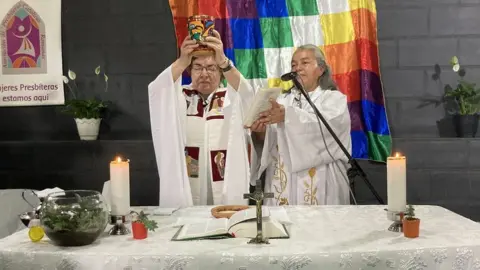
Her ceremony in 2010 was a secret, but she says she has got support from the Church's local hierarchy: "There was a bishop… a Roman Catholic whose name we do not say so as not to get him in trouble with the Vatican."
"I was very afraid that people would suddenly start insulting me or throwing things at me at the altar, in this very conservative society I live in.
"So the support I received from people was a great surprise, and that strengthened and reinforced my mission," says Álvarez. She has now been promoted to bishop within the Association of Roman Catholic Women Priests (ARCWP), which is not recognised by the Vatican.
Álvarez comes from a very devout Catholic family but had the support of her mother, a former nun. Her brother, a priest, gave her a gift of a chalice which she sees as a form of silent support.
Álvarez is insistent that there is nothing in Scripture to exclude women from the priesthood: "It's a human law, a Church law, and an unjust law need not be adhered to."
This is a sentiment shared by the Women's Ordination Conference (WOC), a group that lobbies the Vatican for women's access to the priesthood through calls for dialogue and demonstrations.
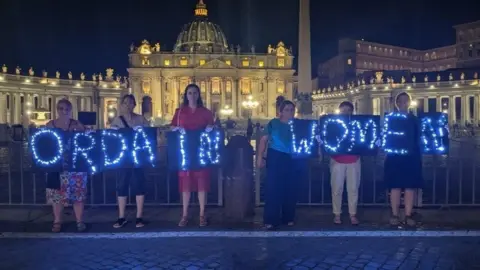 Women's Ordination Conference
Women's Ordination ConferenceExecutive director Kate McElwee says her favourite work is what they call the Ministry of Irritation - which has seen supporters doing everything from releasing pink smoke during the Conclave to lying in the road as the Pope's motorcade came through the city. For their actions, they have been detained by Vatican Police.
"We walk with these women in their vocation and they're waiting for the Vatican to open its doors and really confront its sins of sexism," says McElwee. "But meanwhile for other women it would be impossible to wait, the call is so loud and so clear from God that they have no choice but to break an unjust law."
A 'closed door'
The Church sees these ordinations not just as illicit but also invalid.
After the Danube Seven story became public, Cardinal Joseph Ratzinger, later Pope Benedict, declared that since the women gave no indication of repentance, "for the most serious offense they have committed, they have incurred excommunication".
Pope Francis has himself ruled out a woman ever serving as a priest. In 2016, when asked about any chance this could change, he referenced a 1994 document from John Paul II that said that the "door is closed" to women's ordination, which the Pope said "stands".
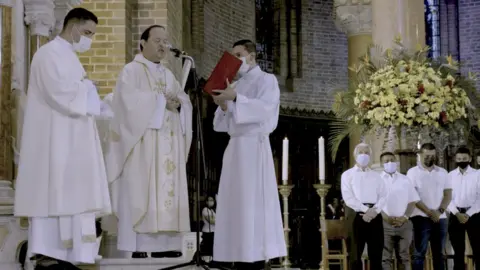
Sister Nathalie Becquart works from an office in Vatican City, with a picture of her and Pope Francis behind her. In February 2021, she was the first woman to ever be appointed as an Under Secretary to the Synod of Bishops, a body which advises the Pope.
She puts the current position on women priests simply: "For the Catholic Church at this moment, from an official point of view, it's not an open question."
"It's not just a matter of you feeling you are called to priesthood, it's always a recognition that the Church will call you to be a priest. So your personal feeling or decision is not enough," says the French nun.
Sister Becquart is one of a few women given key senior roles under Pope Francis' pontificate. Her position makes her the first woman in the Vatican with voting rights.
She believes there is an evolution happening, allowing more women to take up leadership roles, yet roles that are "disconnected from ordination."
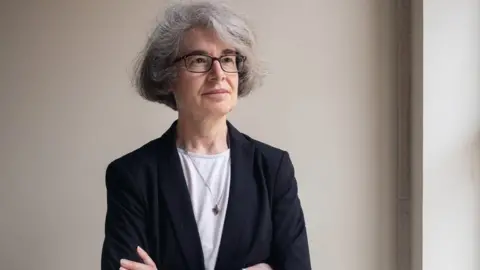 Francesco Pistilli
Francesco Pistilli"I think we need to broaden our vision of the Church. There are many, many ways for women to serve the Church," Sister Becquart says.
But she also notes that change is never easy, and always faces "fears and resistance".

What does the Catholic Church say?
- Catholic doctrine, or its legal interpretation, reference priesthood as being a prerogative of men - stating that "a baptized male alone receives sacred ordination validly" (Canon 1024).
- A 2021 revised version of Church law (Canon 1379) explicitly criminalized conferring sacred orders on women latae sententiae - a legal term which means that the penalty is incurred automatically, without the need for a judgment.
- Pope Francis previously appeared to open the possibility of ordaining women as deacons, who cannot celebrate mass but can officiate funerals, baptise and witness marriages.
- In an unprecedented move, Pope Francis has asked ordinary Catholics for their views on the future of the Church, in a two-year consultation process called the Synod on Synodality. And in a move that made headlines, the Vatican included resources from the Women's Ordination Conference on the Synod's website.
- A recent working document suggests women's role in the Church will be high on the agenda when bishops gather in Rome next October to discuss the results of the consultation.
- Sister Nathalie Becquart told BBC 100 Women that "through the Synod on Synodality, we will continue to discern and the Pope will see what will be the next step."


BBC 100 Women follows two women who have been ordained in the US and Colombia. Is there a future for women priests? And can this change happen in our lifetime?

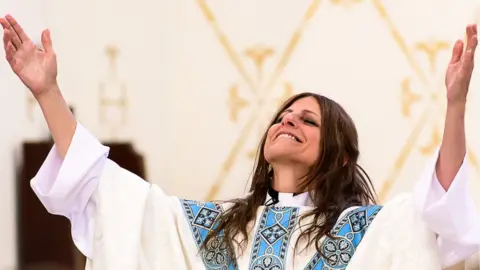 Anne Tropeano
Anne TropeanoA different way
In a hushed Cathedral Anne Tropeano approaches the nave, faces her bishop and proclaims full of emotion, "Here I am, I am ready."
It's a day she has waited for for 14 years. The 'ordination' ceremony follows a similar liturgy to that which men becoming Catholic priests would experience - including the laying on of hands and prayer of consecration.
During the ceremony, Bishop Bridget Mary Meehan lifted Tropeano's arms and presented her to the clapping congregation. The newly 'ordained' Anne said she felt "embraced".
Tropeano prides herself on being the face of a different ministry, one with more participation and less hierarchy. As well as one that is open to groups traditionally questioned by the Church.
"Nobody is turned away from communion. Whether or not you've been divorced, none of that matters. Everybody is welcome, LGBTQ people are welcome at the table," she says.
Olga Lucía Álvarez also sees female priesthood as an opportunity to redefine the relationship of lay Catholics with their altar representatives.
There is an opportunity in the current state of the Church, says the Colombian woman 'bishop', given the dwindling number of vocations and the clerical sex abuse scandals that have severely damaged trust in priests.
"How can they say they are the sole representatives of God on Earth? They have no shame," she says about the series of abuse allegations worldwide.
Pope Francis has apologised to the victims of sexual abuse committed by clerics, and has condemned the Church's "complicity" in hiding the "grave crimes".
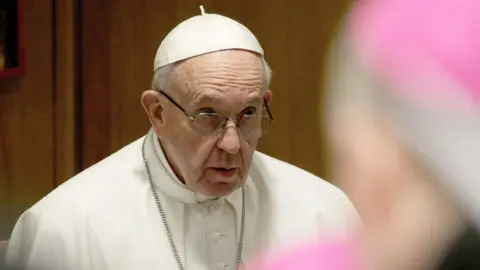 Getty Images
Getty ImagesÁlvarez sees women's ministry as an answer. At 80, she spends her time mentoring younger women who are hoping to become priests.
"It is urgent to show another face of the priesthood. We cannot let history repeat itself."
The movement for women's ordination wants an open debate on the ban, as they are confident to have the support of lay Catholics.
In Brazil, the country with the largest Catholic population in Latin America, almost eight-in-ten Catholics said they were supportive of women priests. In the US, the figure was six-in-10, according to a 2014 survey. Yet the movement for women's ordination has not yet taken off in Africa, the region with the fastest-growing Catholic population.
When it comes to the possibility of change, Tropeano appeals to the Pope himself to open up a dialogue.
"You need to have an audience with women who are called to priesthood. Whether they have been 'ordained' as part of this movement or not, you need to hear our experience and take that into your prayer."
While the fight for women's ordination to priesthood still looks as though it could be a long one, Tropeano thinks it is vital for the future of the Church.
"The Church will not be able to fulfil its mission unless there's equal participation. At the moment there is nothing more important."

BBC 100 Women names 100 inspiring and influential women around the world every year. Follow BBC 100 Women on Instagram, Facebook and Twitter. Join the conversation using #BBC100Women.
